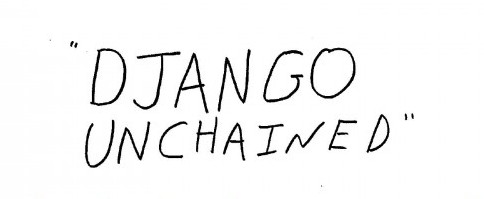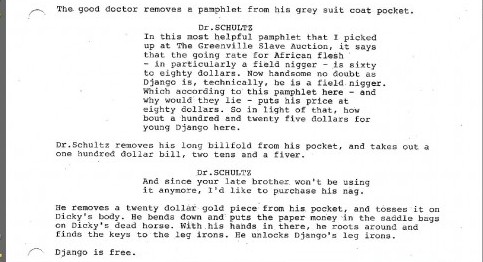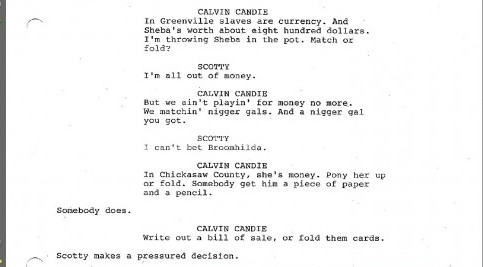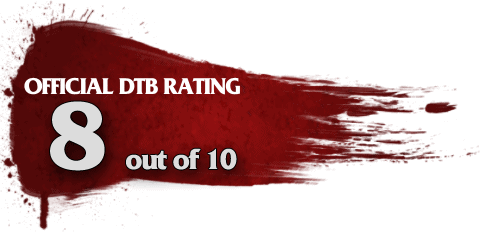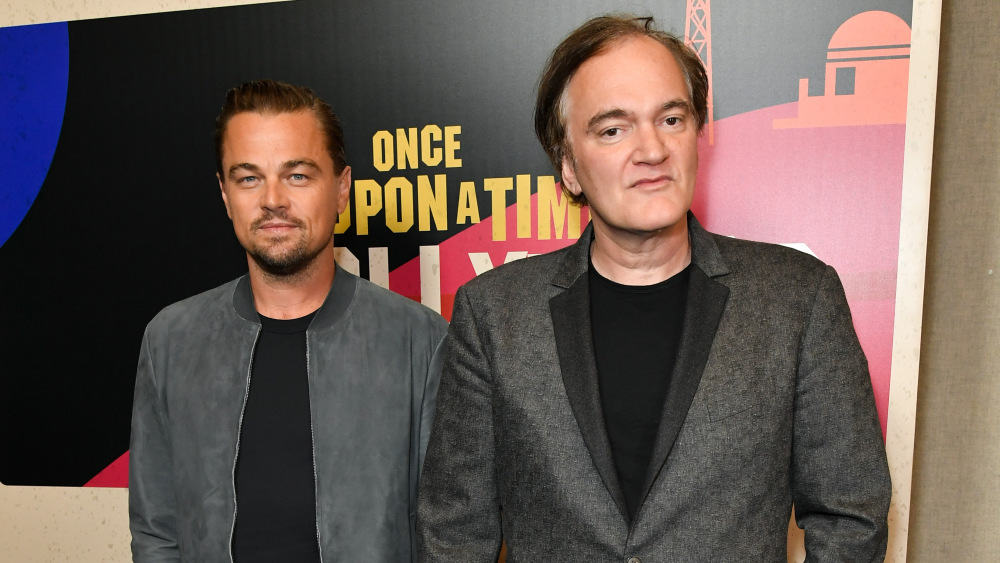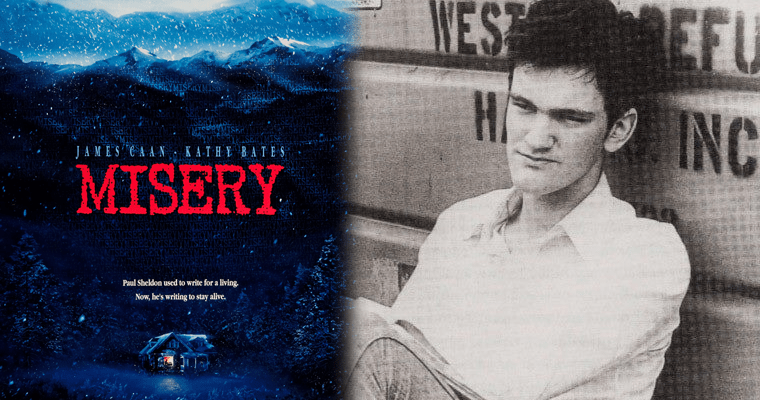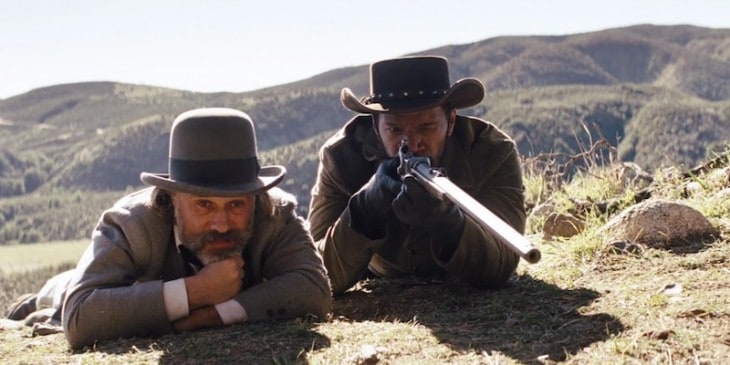Script Review: DJANGO UNCHAINED by Quentin Tarantino
There are few directors out there that get as much attention and admiration as Quentin Tarantino. The director has single-handedly helped restart actors’ careers (John Travolta), while also redefining filmmaking with his unique ability of mixing different types of film genres. His love and admiration of exploitation cinema has gained him legions of excited fanboys, while his clever dialogue and storytelling abilities have earned him praise from critics and film festival judges. Though the man has had a few missteps (in my opinion) with his most recent films, I still applaud the effect he has had on modern cinema. Furthermore, I am always excited to see what the enthusiastic director has next up his sleeve. When I was given the opportunity to be able to read Tarantino’s most recent script set to begin filming this fall, Django Unchained, I leaped at the chance to read the massive new script. What will follow includes some spoilers about the film and actual screen-shots of the script but will mainly be a spoiler-free review.
Django Unchained opens with a slave named Django who is recently purchased by a group of men. After the auction, the Speck Brothers and their recent purchases (slaves) are traveling back to their farm when a stranger in the road stops them. When polite exchanges quickly turn to all out threats, a skirmish breaks out resulting in this stranger overtaking the men. This stranger is Dr. Schultz, a German dentist who is also revealed to be a bounty hunter. Schultz releases Django under the agreement that he will help him find a man he is looking for. In the next town, the two riders are greeted by dirty looks by the townspeople who aren’t used to seeing a free black man. Schultz soon realizes he wants to help his new friend even more. He promises to help Django find his captive wife Broomhilda if Django trains to become a bounty hunter as well. Through this Schultz will be able to have a helping hand with his hunting. The two track Broomhilda to a farm occupied by three brothers. These slave-owning brothers are just the next step in the duo’s search after we learn she has a new master now. This search ultimately leads them to Calvin Candie; one of the most notorious slave-owning men in all of the south. Candie specializes in mandingos (black slave fighters). In order to avoid suspicion, the two pose as mandingo experts to get close enough to free Broohilda from the evil slave-owner.
Django Unchained is said by many to be Tarantino’s take on the “spaghetti-western” films that served as an inspiration for him. Though it includes nods to the genre made famous by Sergio Leone, it doesn’t exactly fit into this category. In a lot of ways, it feels more like a period-piece, character drama than anything else. Sure, it takes place in the west and includes a few well staged gun-fights, but based on the structure of this script, never did I feel it would fit in that genre. Like most of Tarantino’s scripts, it relies way too much on a larger cast of “colorful” characters to ever feel the gritty loneliness of “The Man With No Name” films. This, I feel, is completely intentional. Tarantino has set out to make his own film that incorporates elements of this gritty west, while also wanting to make a film that captures the times of the slavery movement in the south. This script is much more concerned with recreating this landscape of hate, racism, and greed, than recreating iconic large-scale gun battles. This is where the film will make or break people. It details this disgusting world so vividly that it will without a doubt offend people. There is no doubt about it. The dialogue and imagery in this film will shock and right-out offend viewers who don’t exactly know what they are getting themselves into. Besides the fact that the “N” word is thrown around as often as blood sprays at the end of Kill Bill Vol. 1, the film utilizes the language, terminology, and images that were unfortunately so very common at this time in abundance. We see naked whipped slaves, slaves torn apart by vicious dogs, slave on slave (mandingo) fighting for the pleasure of white owners, slave women referred to as “ponies” and purchased for sex by white men, and this is just the tip of the iceberg. I will be interested to see how the MPAA handles the subject matter and how much will be allowed in the film. Though it seems to be steeped in factual occurrences, these are scenes that don’t shy from the repulsing details of slavery.
The first half of the film concerns itself with these details far less than the later half. Django and Dr. Schultz’s growing friendship at the beginning has a much more lighter air than the later parts of the script. The first half infuses much more comedy into it with Schultz’s overly eloquent manner of speaking; even when he is about to kill someone. His character will easily bring to mind Christoph Waltz in Inglorious Basterds. They both possess a polite charisma that results in a couple of humorous scenes.
It is a testament to Tarantino’s writing ability, that this carefree charm that Schultz gives off, is quickly dropped when we meet our main villain of the film. It is about halfway through the script that we meet Calvin Candie and his ranch filled with slaves called “Candyland.” Both, Dr. Schultz and this reader quickly realize this is no laughing matter. He is a character that has absolutely nothing redeeming about him and makes for a great “love-to-hate” villain. This is where the truly disgusting world of the slave-trade is fully displayed. This is also where the script takes full use of the more “colorful” language and terminology that was associated with slave owners. At first, my gut reaction was that Tarantino used a lot of this language for exploitative and shock purposes. Yet, the more I think about it, I feel that it just paints a vivid picture of this evil man and how he interacted with his counterparts and slaves. Though it seems a bit much at times, I can understand why Tarantino made Calvin Candie talk the way he does.
Though the script is very long and clocks in at a staggering 168 pages (think about a page a minute in film length), Django Unchained moves very quickly. It is probably Tarantino’s most straightforward scripts he has written yet. It has a very classic feel to it which is felt while reading it. Since Tarantino writes camera shots, camera movements, and music cues in his scripts, you get a feel how this will be directed. Gone are the more modern filmmaking techniques Tarantino has used to over exertion in his past films (there is no unnecessary Sam Jackson voiceover like in Basterds explaining a type of film or any other item for that matter). Here, he seems to be making a more sophisticated and structured film. Though there are occassionally flashbacks, the time table of everything is in order. What he also does well is maintaining a consistency with the language of the time period. Aside from the inclusion of a “calm-the-fuck-down” by one of the characters (was that really a common phrase back then), most of the dialogue strays from any modern flourishes. I will say, that I find this to be a much more tonally sound film then Inglorious Basterds, which I didn’t love (aside from two outstanding scenes). The script has a basic continuing motion that pushes the story: Django’s longing to be reacquainted with his wife. Although this is known fairly early on, by the end of the read this almost becomes less important. We know that he loves her, but the extent of their relationship is never fully felt. Maybe it might translate better on film, but by the end of everything their relationship becomes more of an afterthought. If changes are to be made, I would include more flashbacks or anecdotes detailing Django and Broomhilda’s relationship. In what is otherwise a very entertaining and interesting read, this was my only major complaint. If I had to put money on it, I would also bet that the ending might be slightly altered to have more of a dramatic impact. We’ll see though.
All in all, I am pleasantly surprised with Tarantino’s new script and am very excited about seeing this fully realized on screen. For me, it seems to have a more coherent and focused attention then Inglorious Basterds, Kill Bill, and Death Proof. Depending on how he casts this film, it could make for a very entertaining and emotional ride. Django Unchained seems to reflect a more mature Tarantino who seems to have grown tired of being the Tarantino everyone either loves or hates. Though the script easily feels like a Tarantino script, it also feels like a director wanting to make a change in his approach to films. Using simple dialogue and iconic characters that stay with you, Django Unchained constructs an epic story that doesn’t need numerous film references to stand on its own.

